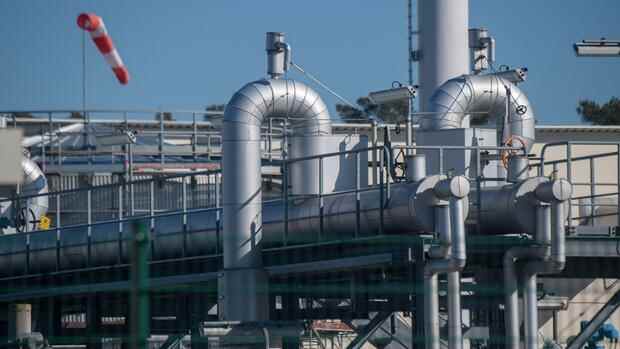Dusseldorf As early as Tuesday morning, significantly less gas flowed through the Nord Stream 1 Baltic Sea pipeline than in the previous days. Just 112 million cubic meters are still arriving from Russia, 30 percent less than would be possible. The Russian energy company Gazprom even announced that the maximum delivery volume would have to be further reduced.
The reason for this are delays in repair work by Siemens, the state-owned company said on Tuesday via the Russian news agency Tass. A gas compressor unit was not returned in time from repairs. The energy technology group Siemens Energy has not yet commented on this.
According to experts, this failure has nothing to do with the annual maintenance. During the annual inspection of the giant pipeline, which lasts about two weeks, there are regular complete failures. So far, however, these have always been announced in the long term and mostly fell in the summer months or in September.
Nord Stream 1 is the main supply route for Russian natural gas deliveries to Germany. Currently, without the missing spare part, only up to 100 million cubic meters of gas can be pumped through the pipeline – or around 60 percent of the previously planned daily volume of 167 million cubic meters of gas, according to Gazprom. For comparison: Germany consumes around 230 million cubic meters of gas on an average day. Significantly less in summer.
Top jobs of the day
Find the best jobs now and
be notified by email.
“If this failure via Nord Stream 1 only lasts a few days, it will not be a problem for the European gas market,” gas expert Andreas Schröder from the market research company ICIS told Handelsblatt. However, the missing 40 to 70 million cubic meters per day are clearly noticeable in the event of a failure lasting several days.
Rising gas prices, well-stocked storage facilities
In addition, the technical problems at Nord Stream 1 coincide with an unplanned outage in Norway. “Yesterday, 60 million cubic meters of natural gas were affected there,” says Schröder. According to the expert, this should have a significant impact on the price.
One megawatt hour of natural gas cost 84 euros on the Dutch TTF exchange in the morning. In the meantime, this value has risen to 92 euros. This means that the gas price is still a long way from the record levels at the beginning of March, when a megawatt hour cost 300 euros at times.
The situation at the German gas storage facilities is meanwhile “healthy” again, according to Schröder. “We already have a German filling level of over 55 percent. The location is also good throughout Europe.”
More: The federal government wants to rush to help Gazprom Germania with billions


